What Is the Best URL Structure for SEO?
Apr 09, 2025
Written by Casey Bjorkdahl

Casey Bjorkdahl is one of the pioneering thought leaders in the SEO community. In 2010, Casey co-founded Vazoola after working for a Digital Marketing Agency for five years in New York City. Vazoola is now one of the fastest growing and most widely recognized SEO marketing firms in the country.
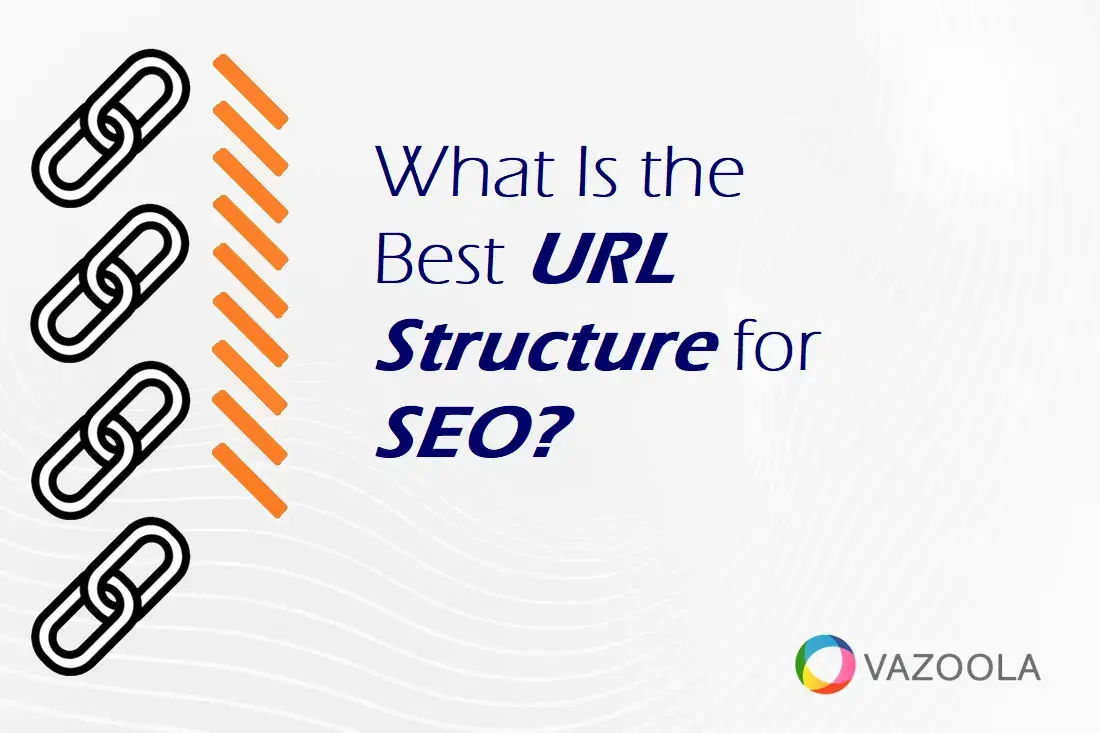
The URL serves as more than just a web address. It plays an important role in search engine optimization and user experience. URLs also impact how search engines understand content, how they influence click-through-rates, and how they make it easier for users to navigate to and around the site.
As a result, a messy, overly complex URL can confuse both search engines and visitors, thereby harming rankings and engagements.
To create an SEO-friendly URL, you have to do more than just choose a few keywords. With the right structure, you ensure clarity, security, and ease of indexing. It makes no difference if you’re optimizing existing pages or launching new ones, you can significantly boost your website’s visibility with your best possible structure of a URL.
So, what is the best URL for SEO?
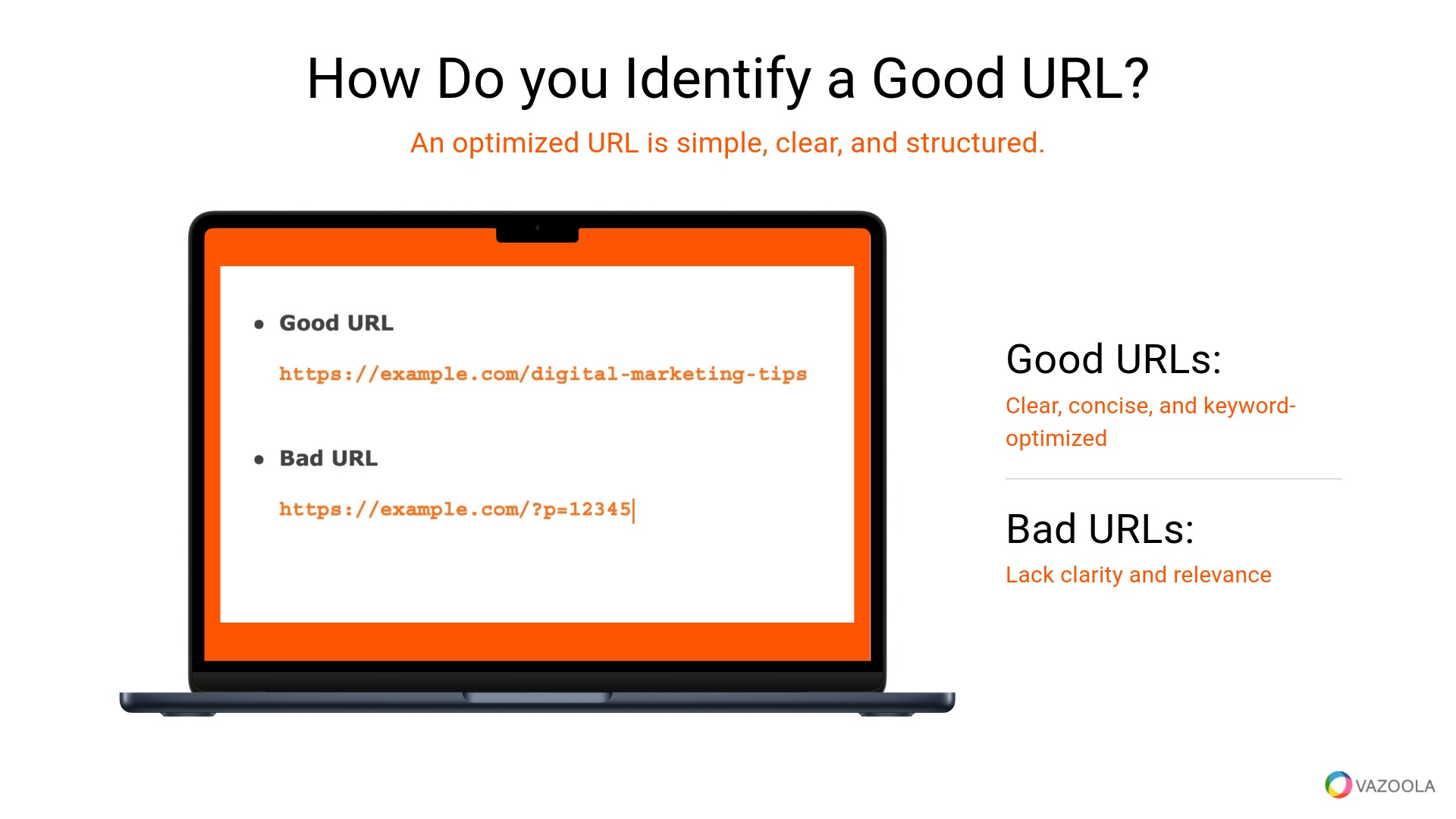
Key Takeaways About URL SEO
-
A well-structured URL improves search rankings and enhances user experience.
-
Short, descriptive URLs with relevant keywords are easier for search engines to crawl.
-
Secure, logical URLs help build credibility and improve click-through rates.
Table of Contents
What Does URL Structure Mean?
Let’s start by defining a URL. The Uniform Resource Locator is the address that directs users, search engines, and web browsers to a specific web page. For example, the URL for a hypothetical piece of Vazoola content might look something like this:
http://www.vazoola.com/resources/article-name
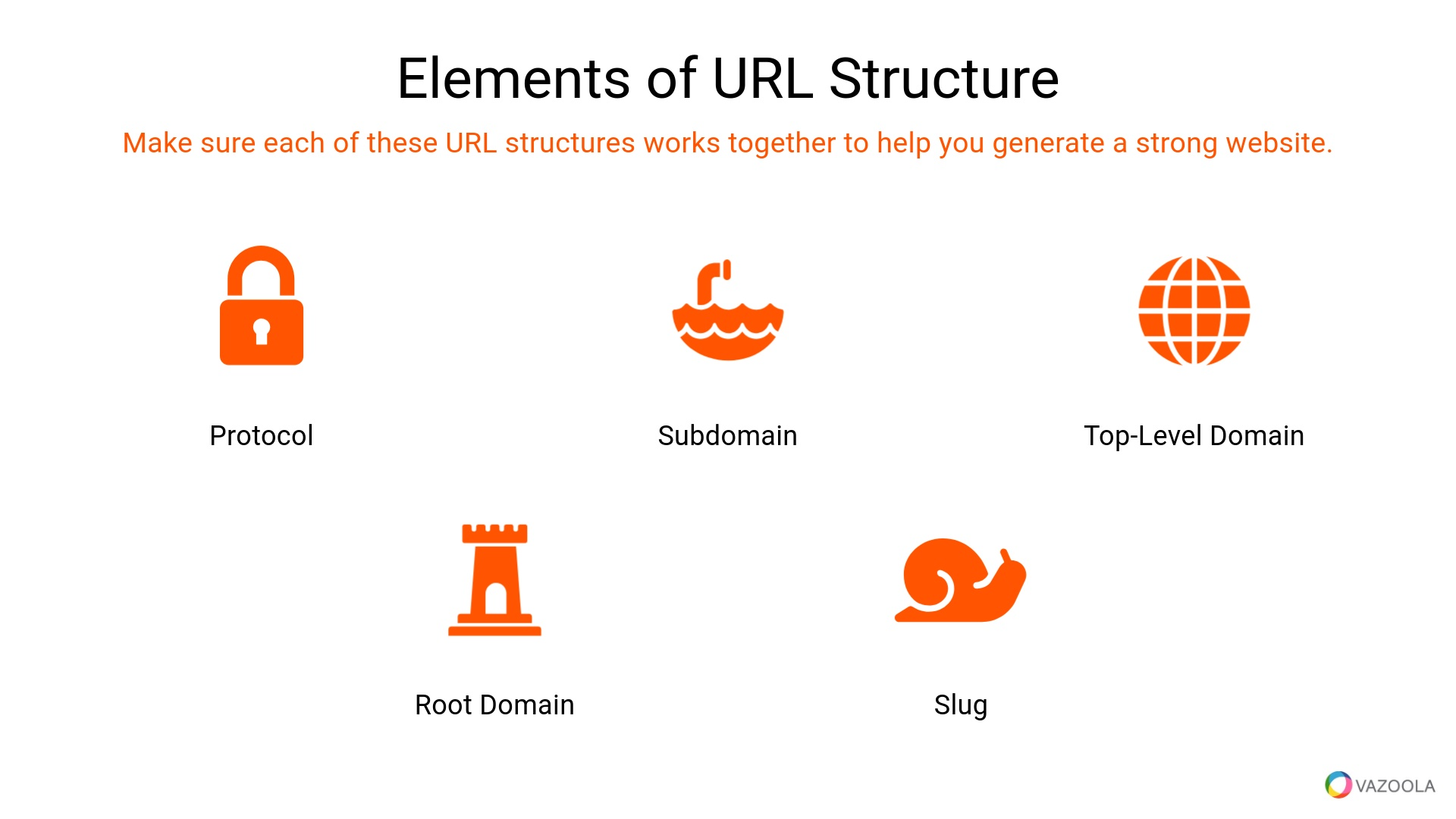
Each URL consists of several elements:
-
Protocol: How the browser retrieves the resource, for example: HTTPS, where "S" ensures security.
-
Subdomain: A prefix that categorizes content, for instance: “blog.example.com”.
-
Root Domain: The primary identifier of a website, such as: “example.com”.
-
Top-Level Domain (TLD): The domain extension: .com, .org, .edu, etc.
-
Slug: The unique identifier for a specific page or resource, for example: “/seo-tips”.
The last part of the URL, the slug, should match the name of the topic or article name, or a shortened form of it.
Make sure each of these URL structures works together to help you generate a strong website.
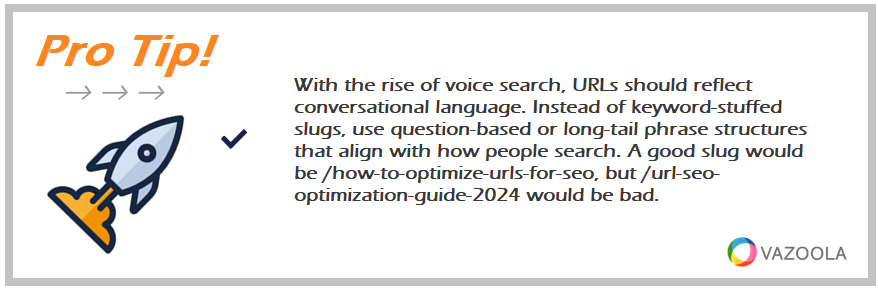
With the rise of voice search, URLs should reflect conversational language. Instead of keyword-stuffed slugs, use question-based or long-tail phrase structures that align with how people search. A good slug would be /how-to-optimize-urls-for-seo, but /url-seo-optimization-guide-2024 would be bad.
Flat vs Hierarchical URL
The way URLs are structured plays a key role in both user experience and search engine optimization. Websites typically follow one of two URL structures: flat or hierarchical.
Choosing the right structure depends on your site’s size, content organization, and long-term scalability. While neither structure is right or wrong, one will be more appropriate than the other depending on the situation.
Flat URL Structure
A flat URL structure keeps all pages at the same level, reducing the number of subfolders. This approach results in shorter URLs. Those can be beneficial for simplicity and ease of sharing.
Flat URLs work well for small websites with fewer categories or a limited number of pages. For example:
-
https://example.com/product-name
-
https://example.com/blog-post-title
However, as a website grows, a flat structure can make it harder to organize related content. Without clear categorization, users may struggle to navigate to various pages, and search engines could have a harder time understanding the relationships between pages.
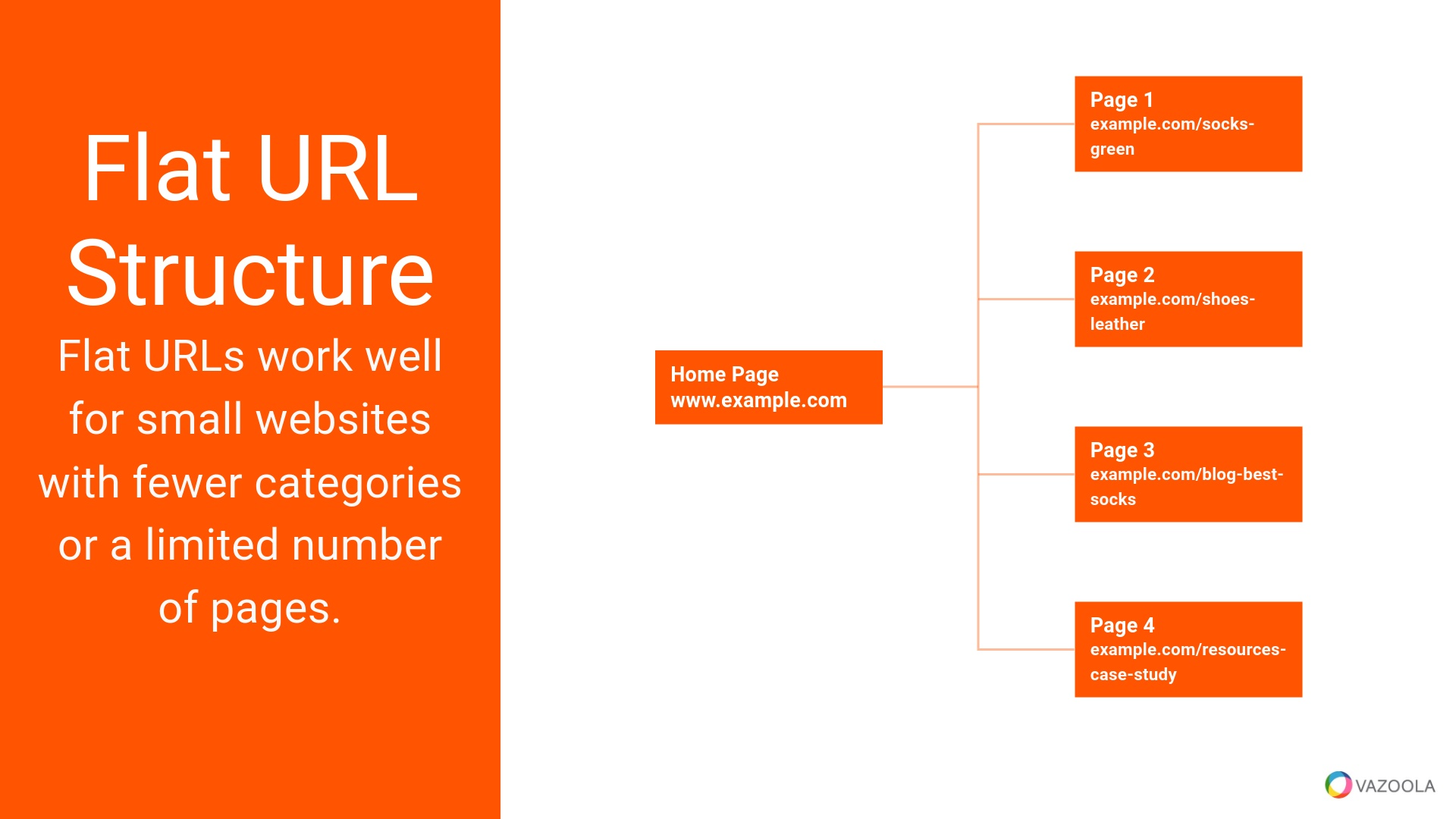
Hierarchical URL Structure
A hierarchical URL structure organizes content into logical categories and subcategories, much like a catalog groups related products or a retail store arranges similar items together.
The approach enhances the user experience by making navigation intuitive, and it helps search engines better understand a site’s structure.
For example:
-
https://example.com/shop/shoes/sneakers
-
https://example.com/blog/seo/url-optimization
For most websites—especially eCommerce stores, large blogs, and content-heavy platforms—a hierarchical URL structure is usually more effective. It improves internal linking, boosts keyword relevance, and makes it easier for search engines to crawl and index related content.
While both structures have their place, hierarchical URLs tend to be the preferred choice for larger, well-organized websites since they provide a clear roadmap for users and search engines alike.
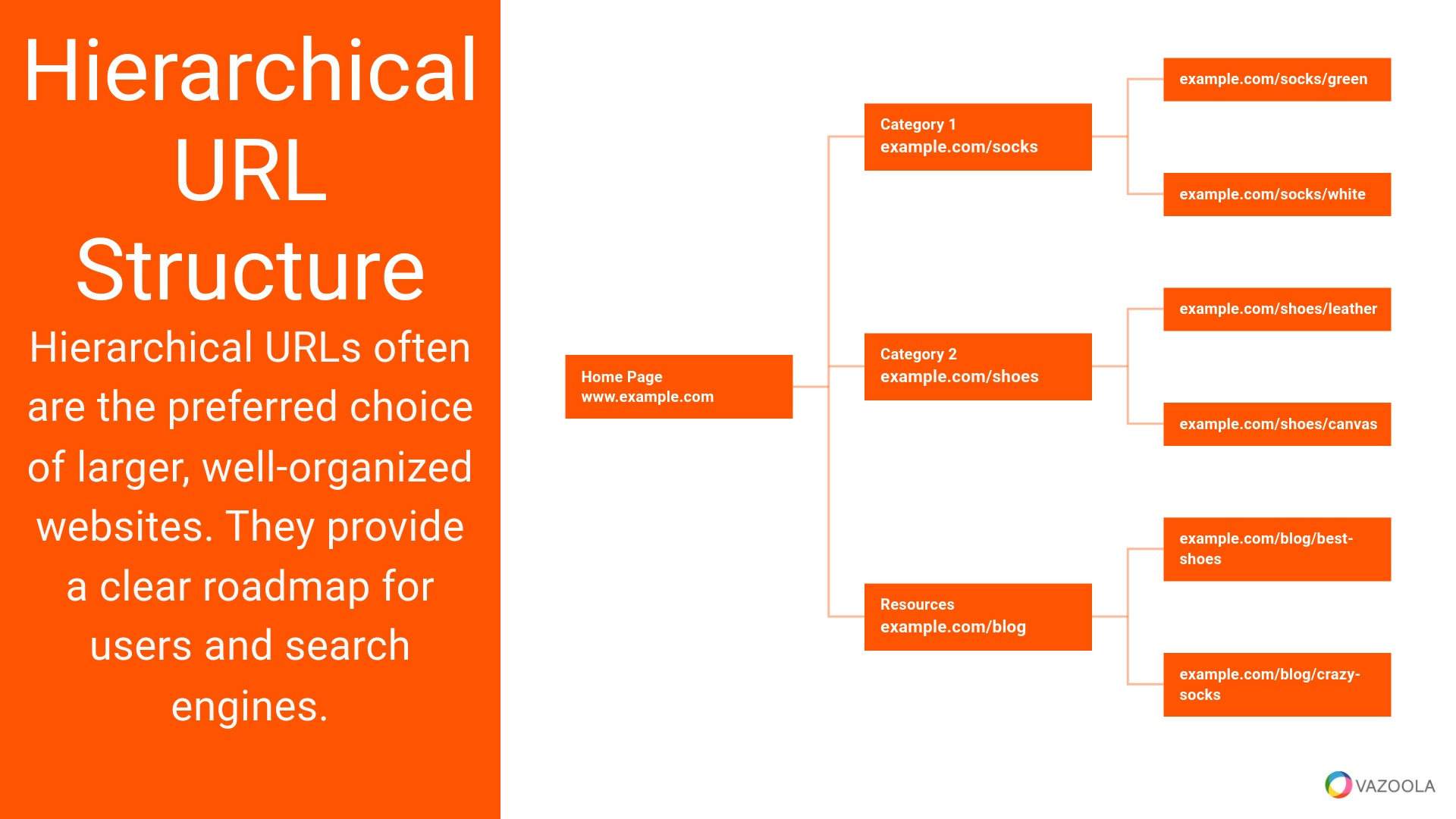
What Defines a Properly Optimized URL?
An optimized URL is simple, clear, and structured. It enhances both the user experience and search engine rankings. The best SEO URL structure examples follow a few key principles, including:
-
Readability: URLs should be human-friendly and easy to interpret.
-
Keyword Inclusion: Place relevant keywords in the URL to help search engines categorize content.
-
Short and Simple Structure: Shorter URLs improve navigation and indexing.
-
Logical Organization: URLs should align with site structure and category hierarchy.
-
Secure Protocol: Google prioritizes HTTPS websites for better security.
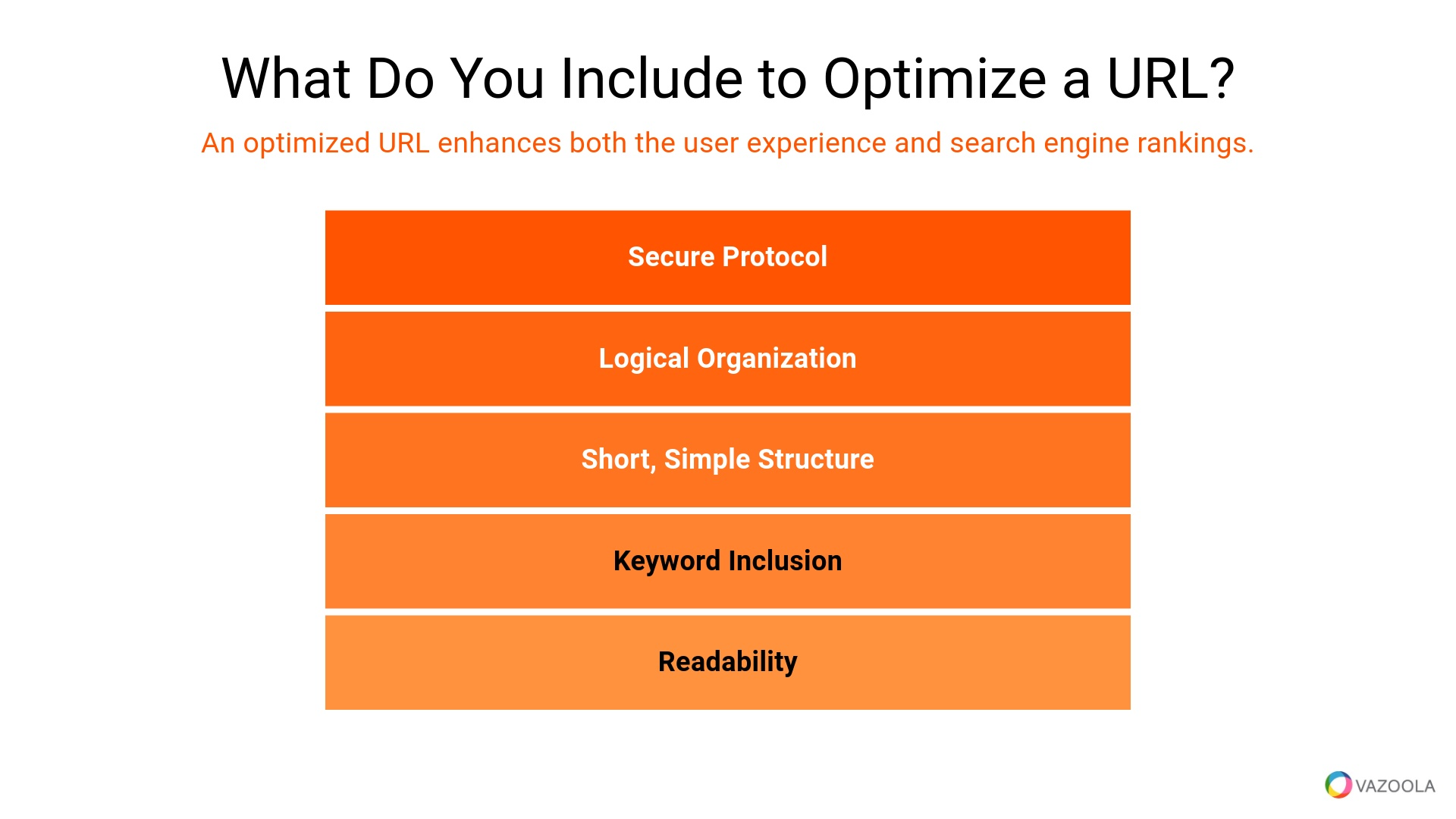
Ready to put these qualities into context? Here are some examples of good and bad URLs:
-
Good URL: https://example.com/articles/digital-marketing-tips (clear, concise, and keyword-optimized)
-
Bad URL: https://example.com/?p=12345 (lacks clarity and relevance)
A properly structured URL makes it easier for users and search engines to find, understand, and navigate your content.
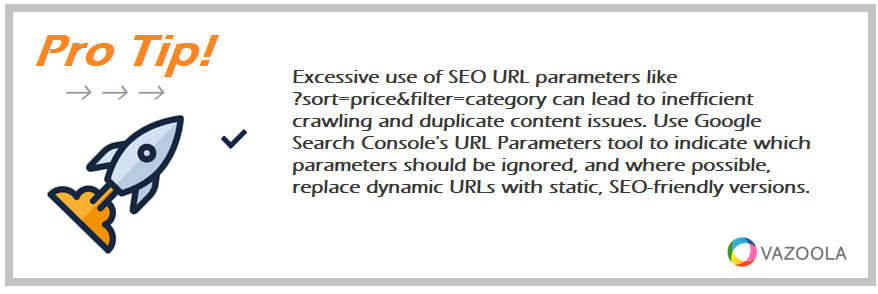
Excessive use of SEO URL parameters like ?sort=price&filter=category can lead to inefficient crawling and duplicate content issues. Use Google Search Console's URL Parameters tool to indicate which parameters should be ignored, and where possible, replace dynamic URLs with static, SEO-friendly versions.
SEO Friendly URL Structure Best Practices
If you want a URL that’s friendly for SEO, there are several points to keep in mind. From naturally using keywords to boosting security, the following on-page SEO URL best practices will set you on the road to an effective URL.
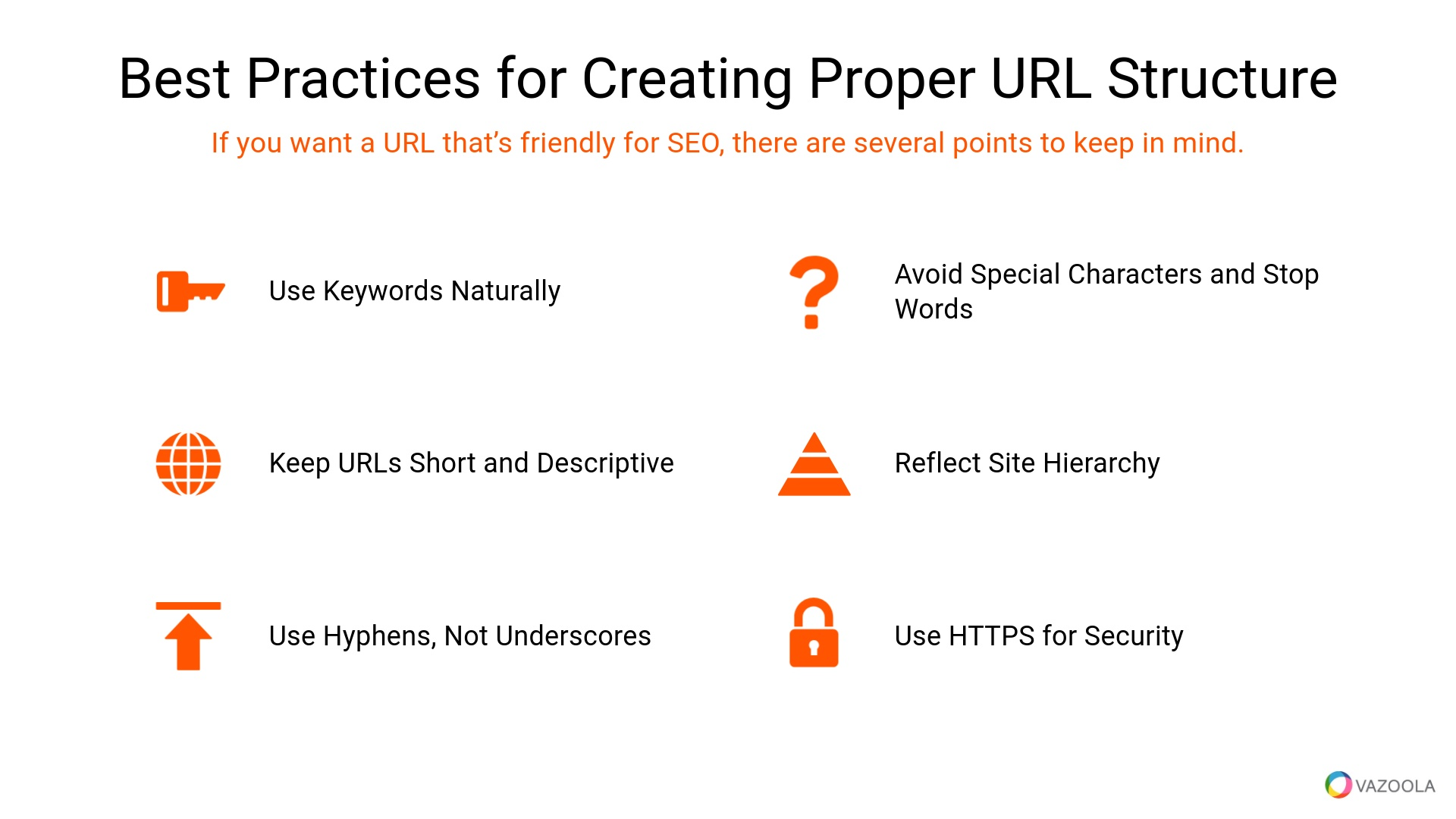
Use Keywords Naturally
Include relevant keywords in your URL to help search engines and users understand the page content. However, stuffing too many keywords can look spammy. Keep it simple and relevant.
-
Good: /email-marketing-strategies
-
Bad: /best-email-marketing-strategies-for-business-growth
Avoid Time-Stamping URLs
URLs are like permanent addresses. If you put a date in the slug, you’ve put an expiration date on it. In the example below, the slug works forever. The content (title, headline and body copy) can be updated annually with fresh data.
-
Good: /best-email-marketing-platforms
-
Bad: /best-email-marketing-platforms-for-2019
Keep URLs Short and Descriptive
What’s the ideal SEO URL length? Shorter URLs improve readability and make it easier for users to remember your web pages. Avoid long, complex strings that add unnecessary clutter.
-
Good: /best-coffee-brands
-
Bad: /what-are-the-best-coffee-brands-to-try-this-year
Use Hyphens Instead of Underscores
Google recognizes hyphens as word separators, while underscores create difficulties in readability and indexing. Always opt for hyphens between words.
-
Good: /seo-guide
-
Bad: /seo_guide
Avoid Special Characters and Stop Words
Special symbols and characters like &, %, and ?, as well as stop words like “and,” “the,” or “of” add unnecessary complexity to SEO URLs. Removing them improves SEO.
-
Good: /chocolate-recipes
-
Bad: /the-best-chocolate-recipes-ever-for-baking
Ensure URLs Reflect Site Hierarchy
When you organize URLs logically, it helps users and search engines understand how content is structured within a website.
-
Good: /blog/seo-tips
-
Bad: /seo-blog-category-12345
Use HTTPS for Security
Google favors HTTPS websites over HTTP. A secure URL protects sensitive information and builds trust with visitors. Always enable SSL encryption for better rankings and user confidence.
When you follow these URL SEO best practices, your URLs will be clean, functional, and optimized for search engines and users alike.
You might also want to work with a professional team that can help you figure out what structure of URL is best for your website. That way, you can get the most out of each individual post.
Lower Case Text for Consistency
When structuring URLs, consistency is key—especially when it comes to letter casing. While URLs technically support both uppercase and lowercase letters, using lowercase text exclusively is the best practice for SEO and user experience.
URLs are case-sensitive in many web environments, meaning example.com/Page and example.com/page could be treated as different URLs. This inconsistency can lead to duplicate content issues, indexing problems, and confusion for users who manually type URLs.
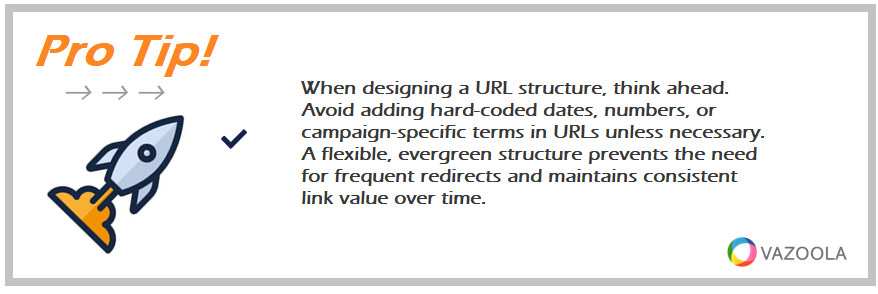
When designing a URL structure, think ahead. Avoid adding hard-coded dates, numbers, or campaign-specific terms in URLs unless necessary. A flexible, evergreen structure prevents the need for frequent redirects and maintains consistent link value over time.
Benefits of a Properly Optimized URL
Now, you may be wondering why you should think about your URL optimization at all. There are several key reasons why this is so important.
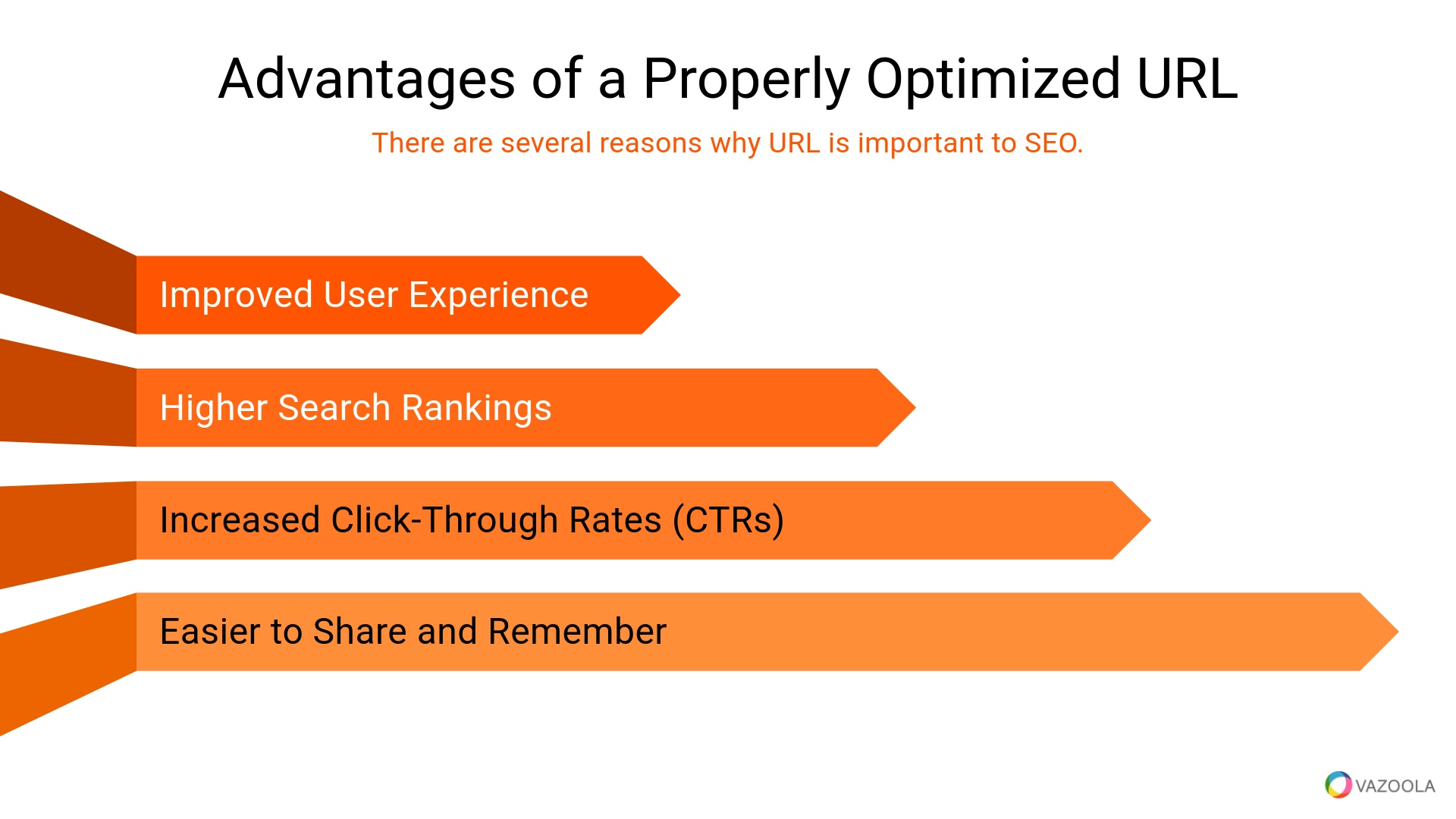
These benefits include:
Improved User Experience
A well-structured URL gives users an immediate idea of what a page is about. When URLs are short, clear, and descriptive, navigation becomes easier, which improves overall site engagement.
Higher Search Rankings
URLs with relevant keywords and proper structure help Google index pages more effectively. A clean, optimized URL tells search engines exactly what your content is about. That increases your chances of ranking higher.
Increased Click-Through Rates (CTR)
Users are more likely to click on a well-structured URL because it looks more trustworthy and relevant to their search query.
Easier to Share and Remember
Short, descriptive URLs are easier to share across social media, emails, and messaging platforms. A confusing, overly complex URL makes it harder for users to revisit or share content.
Ultimately, optimizing your website name is important because it can drive more people to your pages. If you want to increase traffic to your website, you need a strong URL.
Properly Optimized URL Examples
Are you able to clearly envision the optimal structure for your URL? These properly itemized URL example options should offer a clearer picture.
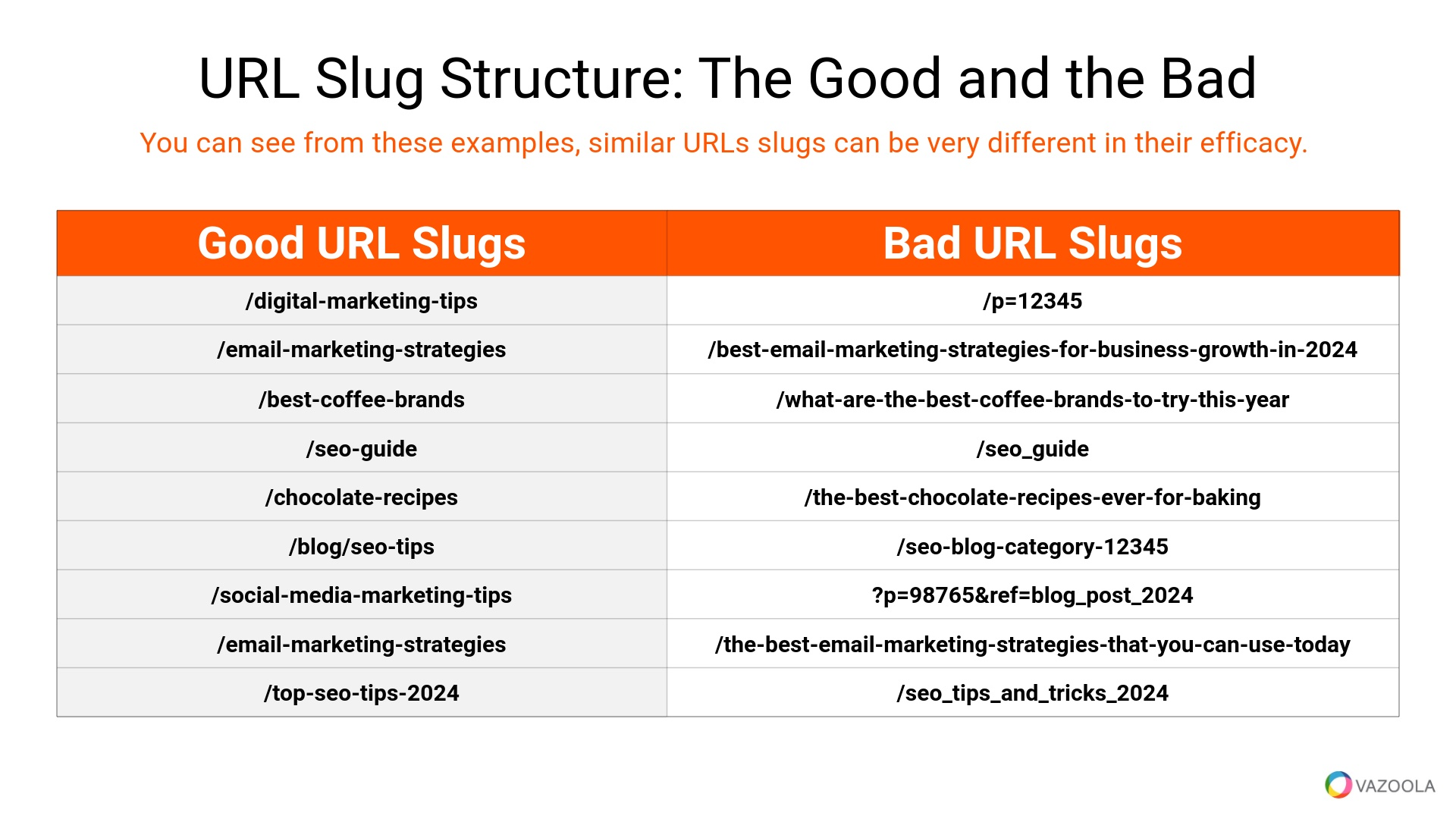
Example 1: A Poorly Structured URL
When your URL is poorly structured, users will be unclear on your website’s content.
-
Bad: https://example.com/?p=98765&ref=blog_post_2024
This URL is difficult to read, lacks keywords, and provides no context about the content of the page.
-
Good: https://example.com/social-media-marketing-tips
This URL is clean, relevant, and keyword-rich, making it easy for users and search engines to understand.
Example 2: Overuse of Stop Words
Too many words can also create a confusing URL that’s difficult to read.
-
Bad:
https://example.com/the-best-email-marketing-strategies-that-you-can-use-today
The URL is unnecessarily long, contains too many stop words, and does not add SEO value.
-
Good: https://example.com/email-marketing-strategies
By removing unnecessary words, the URL remains concise and focused on the keyword.
Example 3: Using Underscores Instead of Hyphens
Underscores are harder for users and Google to interpret.
-
Bad: https://example.com/seo_tips_and_tricks_2024
Google does not treat underscores as space separators, making this URL harder to read.
-
Good: https://example.com/seo-tips
Hyphens create a clearer, more user-friendly structure.
Properly structured URLs make a difference in SEO and usability, helping your website perform better in search ranking and results.
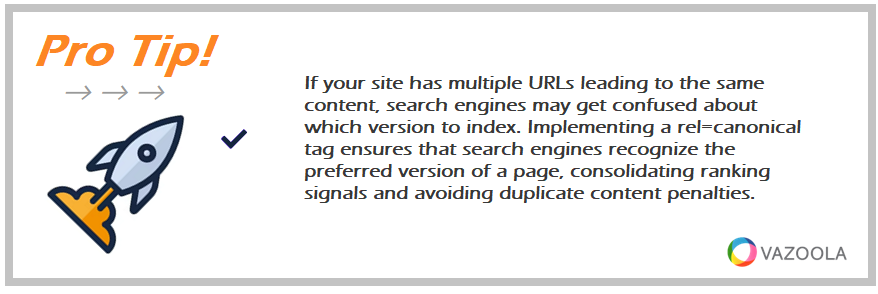
If your site has multiple URLs leading to the same content, search engines may get confused about which version to index. Implementing a rel=canonical tag ensures that search engines recognize the preferred version of a page, consolidating ranking signals and avoiding duplicate content penalties.
Rank Higher with the Right URL Structure
A strong URL structure for SEO is pivotal if you want both users and search engines to favor your website. With a well-optimized URL, you achieve higher rankings, a better user experience, and increased engagement. When URLs are short, keyword-rich, and logically structured, you’ll boost your business’s visibility and credibility.
Simplicity is key to success. A clear and descriptive URL makes it that much easier for users to navigate your website and for search engines to effectively rank your content.
If your goal is to improve your SEO strategy, start with your URLs. After all, they’re the foundation of a well-optimized website.
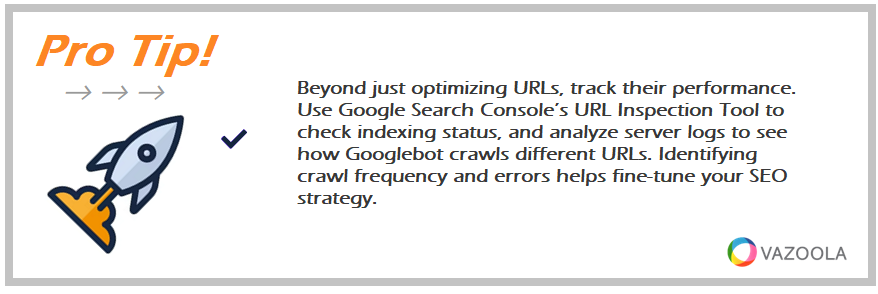
Beyond just optimizing URLs, track their performance. Use Google Search Console’s URL Inspection Tool to check indexing status, and analyze server logs to see how Googlebot crawls different URLs. Identifying crawl frequency and errors helps fine-tune your SEO strategy.

